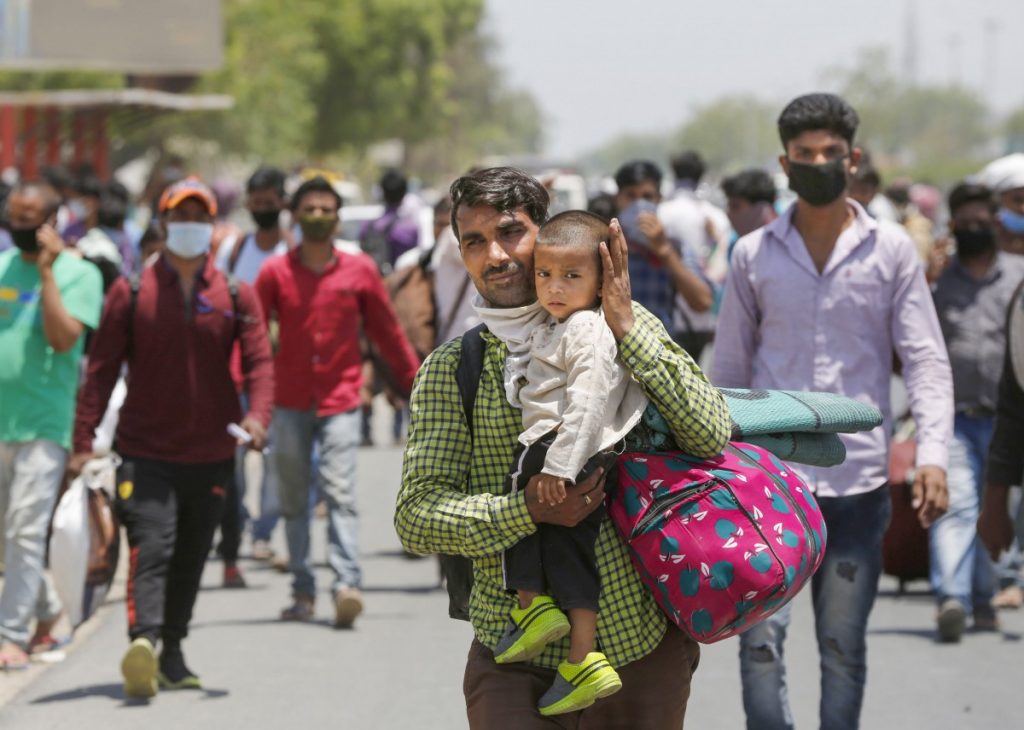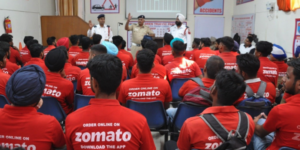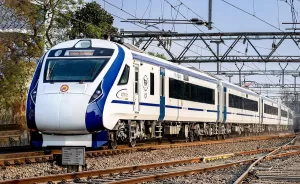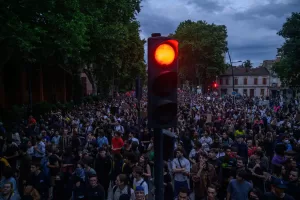Ritika Sah and A.R. Vasavi
Bablu Bhaiya, you stood poised to get into the bus that was to take you to the train station. To a train that would carry you back to Jharkhand, your native land of forests, waterfalls, and your precious family.
Your face bore only a deep relief and not the hate or anger that it could have had. You were returning home after nearly two years, more like a refugee in your own country than a hardworking son returning to rest for a few weeks. Around you, in this police station in Bengaluru, milled hundreds of other workers all seeking to get that special token that would allow them to take a train back home.
The scene, of crowds of young men waiting to be ‘processed’, the long lines of buses, the police who were huddled over papers and tokens, and volunteers who were filling forms, was reminiscent of the many films of the great war in Europe. Yes, for you it was your reality, a new kind of war against working people, which started since the lockdown when you were pushed out of the five-star hotel where you had started as a dishwasher and was now after three years a kitchen help.
Over the past seven weeks, you had huddled in your room along with your roommates whose numbers had swelled from three to eight. How could you have refused to allow these others who had no place to stay? You had pooled in your funds and cooked collective meals for a few days. Then, as money started to run out, you had joined the others to receive free food packets that were being distributed on the streets.
You remembered the leftovers you were entitled to eat at the five-star hotel but which you often did not. You had preferred to eat your own dal, roti, subzi cooked in your room. You recollected the 100 plus food items that were made in the five-star hotel. Remember those special meals cooked for birthdays, corporate parties, and weddings? You had been amazed at the amounts, variety and the cost of the meals. Why, a single meal with the 60 plus items, all in something called a buffet, cost more than what you earned for a whole week.
You had stayed on, learning Kannada, listening to Kannada songs and joining some of your companions to occasionally see a Kannada or Tamil film. From the monthly payments of Rs twelve thousand, you sent some home; for your parents to sustain themselves and to send your younger siblings to the high school in the nearest town.
Your dreams were simple and yet big; you would earn here in this big city, Bengaluru, which they said was to become bigger; a world city with tall towers, where the big people would travel by helicopters, and there would be plenty of jobs for you and for all those who the contractor had recruited from the villages in Jharkhand.
Being so far from home, meant that you did not go home for all the festivals, the rituals or when you fell ill. All this unlike the local workers who would return often to their homes and it was the key reason that employers liked to have workers like you; you provided steady labour; was docile, and happy with the small increments that were promised for regular work.
There were other workers around you; those who worked in restaurants as cleaners, bearers, or cooks, at construction sites, at the metro, and others such as sanitation workers, dhobis, street vendors, security workers, factory workers, coolies, gardeners, and numerous others. They came from different parts of Karnataka and also from other states and spoke different languages. Sometimes, you saw them at the park or waiting for buses. There were women, garment workers, who always seemed to be in a hurry. You saw them getting off factory buses, rushing to shop for vegetables, then walking down the alleys to their homes, sometimes accompanying children or elders.
Then, there were the domestic workers, all women of different ages, who worked in the houses and big apartment complexes. Sometimes you saw them return with food from the homes they worked in; food that they took back to share with their families. Sometimes you smiled at the girls who worked in the beauty parlours, the saloons, and the fitness places. You had been here since six years and you had got yourself a card that they had said was your ‘identity card’, it would get you all the ‘aadhaar’ that a government promised including your voting rights.
But, you could not vote here. You only watched on TV how others voted and followed the news about the governments that came and went. You heard and saw that the new government in Delhi promised, ‘sabka vikas, sabka saath’, ‘progress for all, with everyone”. Maybe, you thought, your village, your region, and all the people in it would no longer be left behind. Maybe that was why it was now easy for you to come to this big city and work here. This is vikas!
There was some talk about rights. ‘Rights’ what was this? Did it apply to your right to get fair wages so that you could afford to send your sister to college or get you medical attention if you fell ill? But, all this seemed to be for someone else. Now, since the lockdown, there seemed to be no rights. You and the other workers were paid your monthly salary for March. Imagine, how generous they were, paying you wages for five days of no work, all because of the lockdown!
But, there was no assurance about the provident fund and other dues, such as bonus for regular and good work. April and much of May, until the buses and trains were started, you had lived in the room and spent your own money. Some of you had called home and asked for money to be transferred to your accounts. “How could the owner pay you? There was no business”, that was what the contractor said. “We’ll see’ is what the manager had said in mid April and now when you called to see if he could help you return home, the phone was switched off.
You and your friends, all twenty of them from various villages in Jharkhand and a few from Bihar, had come to know about the ‘seva sindhu’ through which you had to apply to return home. You paid two hundred rupees to the DTP shopman to fill in the forms and then another hundred rupees to get the print out. Who would know, Bablu Bhaiyya, that a crisis economy could grow on your back? You had submitted the forms at the nearest police station. Ten days after applying, your number was not called.
‘Wait, wait, it’ll come’ is what the policeman at the entrance to the station had told you. Meanwhile, you saw that the number of workers, mostly young men but also a few women, were gathering in larger numbers near the police station. One day, you were told the trains were cancelled since the Karnataka government and the builders wanted the workers to stay back and make sure the economy did not collapse. “What will you do going back home? Stay here, work, and everything will be alright”. This is what you were now told at the police station.
But, for nearly two months nothing was alright. On the news, you saw that the deaths by the virus, something that could not be seen but was spreading, were increasing. Your families wanted to see you and have you with them, they said you could be safer in the villages. Believing that you could finally be going home, you and your friends had checked out of your rooms and reached the police station. Now, suddenly the trains were cancelled and with nowhere to go, you slept outside the police station. You ate when the meal packets were distributed and used the public restrooms.
For you, Bablu Bhaiyya, all of 24 years, working here since you were 18, with hopes of becoming a Bengaluru boy and now dreaming in Kannada, this was humiliating. Had you not thought that here, in Karnataka, you would be assured a time of ‘milk and honey’. Was it not the land that a great poet, Kuvempu, wrote about as one where ‘world humanity’ was to be realised? Where were all the promises in the songs that the famous actor, the state’s cultural hero, Raj Kumar, danced to and which were celebrated—about hard work, honesty, humanity, and fulfilment?
Bablu Bhaiyya, will you forgive us for all these were only false dreams? At this time of intense distress, we forgot all your hard work and contributions. We let the police scream at you and let them beat workers who had started to walk towards their homes. Forgive us, because we did not realise that it was not just food that you needed but also respect, dignity and assurance. We forgot that it was you and the lakhs of others like you who had worked and made Bengaluru into a 24×7 metropolis, its innards buzzing with business, lights blazing, and prosperity that was visible in all the fancy houses and buildings that were coming up.
Bablu Bhaiyya, as you boarded the bus to the railway station, escorted by volunteers, why did you not have hatred and anger for all the abuse we have heaped on you? As the bus sped through the city, Bablu Bhaiya, did you see how empty all the big buildings, the flyovers, the parks, the entertainment centres, and the malls are now? Did you see what was written at the entrance of the Vidhan Soudha: ‘Government Work is God’s Work’. Then, did you ask where was this government that was supposed to be doing god’s work?
Bablu Bhaiyya, forgive us, because we have not only forgotten what god and government are but we have also forgotten our own humanity.
Bablu Bhaiyya, can you forgive us?
(A.R. Vasavi is a social anthropologist and is with the Punarchith Collective which is based in Karnataka.)
◆◆◆
The Wages Of COVID-19 Lockdown In Dharavi – A Sense Of Panic, Loss Of Self
Ritika Sah, Mumbai
“When this lockdown is over, please come to Dharavi; I will stitch clothes for you, for your family,’’ Jamil told me. “Do let me know.”
Jamil lived less than 15 km from my Mumbai apartment, in the slum clusters of Dharavi. Before the lockdown, he worked in a small textile shop in Dharavi during the day and retired to a cramped room that he and seven other co-workers had taken on rent. Years ago, he had migrated to Mumbai from Jharkhand to earn money for his family. When the lockdown was imposed, Jamil’s shop was shuttered. Without money to pay his landlord, he and his co-workers were forced out of their room.
He called the Stranded Workers Action Network (SWAN) seeking help. As a volunteer with SWAN, I helped arrange a small direct transfer of money to cover his immediate needs. His offer to sew my clothes in return was generous. It spoke of the dignity his work gives him, and his pride in being able to provide for his family.
I have had the same offer from others calling for help from Dharavi: to help me with construction work, tiling or whatever their livelihood is. And, whenever I have listened closely, I have heard more. In their dignified voices, I have caught underlying notes of mental anguish that testify to the immense pressure they have been under during the lockdown.
Crammed with makeshift tin and concrete shanties, Dharavi’s houses are particularly vulnerable to the spread of a virus. It is common for more than a hundred people to use a single bathroom. It is quite likely that someone who has been infected with COVID-19 has used it that same day. In the 2.02 sq km spread of Dharavi, there are 225 public toilets for a population of 8.5 lakh, out of which, as of June 3, over 1,849 people were diagnosed with COVID -19. That is higher than the number of infections in all of Assam or Kerala.
More than 70 people from Jamil’s immediate surroundings have already died from the disease. There is no way of practising social distancing in lanes barely wide enough for two people to pass each other without brushing shoulders. And there is no other place to be. Staying indoors – under hot tin roofs – is unbearable; for those like Jamil who have been thrown out, it is impossible. Claustrophobia mingled with the fear of the virus make the situation intolerable.
Even setting aside the pervasive threat of COVID-19, food and money are scarce in Dharavi. From April 5 to May 31, of the 6,319 workers SWAN spoke to in Maharashtra, 52% had rations for only a day or less. In Dharavi, 60% of the 338 workers we spoke to said they had rations that would last just about a day or less.
Community kitchens have been set up in Dharavi by NGOs and religious organisations, but anyone who is late in joining the serpentine queue runs the risk of being told that the food is over. Then, there is no option but to go to bed on an empty stomach.
Most of the migrant workers in Dharavi whom I have spoken to want to escape. In that respect, Jamil was luckier than most. After he and his co-workers were thrown out of their room, they stayed in the workshop for a while. After almost 50 days of the lockdown, on May 12, he located a truck heading to his hometown in Jharkhand and left.
Others I spoke to have not been as lucky. Hira also lives in Dharavi. Before the lockdown, he was the sole breadwinner for his family of five in Bihar. He has not been paid since the lockdown began. In that, he is not alone. Nearly 84% of the workers in Maharashtra that SWAN spoke to said they have not been paid even partially during the lockdown. Like many others, Hira’s savings have dried up. He is desperate to escape Dharavi.
The Maharashtra government has set aside Rs 54 crore to get migrants home safely. Hira is hoping to benefit from this measure. The people living around him in Dharavi are struggling to get home too. They have been borrowing money or selling whatever possessions they have, to pay for the journey home.
The higher the desperation, the higher the travel costs – even a cramped squatting space at the back of a goods truck is going for thousands of rupees, which Hira cannot afford. His only valuable possession is his cell phone. Some time ago, he paid Rs 5,000 to buy it; selling it now will not even cover the cost of the trip home. He needs help but doesn’t know where to turn. Will the Bihar government provide help, or the Maharashtra administration? He sees no way out.
As Hira’s despondency increases, so does his desire to see his family. He told me that the thought of seeing his hometown and the faces of his family members gives him goosebumps.
Migrant workers have spoken to me about their sense of hopelessness and social isolation. Sometimes, when I receive distress calls, I can sense that they just want to be heard by someone, to share their distress and inability to take any kind of action. Their words reflect a sense of panic and a loss of self.
Day after day, as I attend to the distress calls of migrant workers, I can think of only one thing – the crisis-ridden circumstances of these workers and their deep sense of alienation need to be acknowledged in a way that does not destroy their dignity. That basic need is not being fulfilled.
In the time of COVID-19, the narrow lanes of Dharavi are not only physically perilous; they are exerting tremendous strain on the mental health of its inhabitants. That the current crisis comes with immense mental pressure has been widely acknowledged. The United Nations secretary-general, Antonio Guterres, has emphasised, “Mental health services are an essential part of all government responses to COVID-19. They must all be expanded and fully funded.”
On its part, the Indian health ministry has issued regulatory guidelines on handling social isolation during the lockdown and publicised a national helpline for psycho-social support counselling for people in distress – the COVID-19 Mental Health Helpline 08046110007, which acknowledges the need for assistance by children, women, the elderly and adults. I must add, though, that on the occasions I tried dialling the helpline, I was not able to get through.
When it comes to the working class, many are all too ready to believe that the idea of mental well-being is simply not applicable to them because they constitute “just brawn”. How wrong can one be?
When we are confronted with other public health crises, the aim is to do whatever it takes to return them to full health. For that we need to acknowledge that they are affected by the health crisis. Likewise, the extreme mental trauma of migrant workers trapped across the country by the COVID-19 lockdown requires a deeper acknowledgment. Migrant workers need to know from society that they matter, their lives matter, their suffering is of concern to those who inhabit cities they have built.
Jamil, Hira and many more migrant workers whose distress calls I attended came to Mumbai to secure a dignified life for themselves. For the little we at SWAN were able to do – transfer some amount of money to them – they expressed their gratitude, showered blessings and offered their services for free once the lockdown was lifted. It is their physical labour that keeps Mumbai, ‘the city that never sleeps’, on its feet. The pride in their work shone through in each conversation with me. It gave them satisfaction. But more than that, it gave them dignity; their hard work paved the way for their families to move forward in life. That work was put on hold by the lockdown, so too their dignity.
Yet, every time Jamil, Hira and others spoke to me and other SWAN volunteers, what came through was their quiet dignity, despite the deep scars of the lockdown experience they bear on their psyche.
They will survive this storm with their dignity intact. Whether our own dignity and self-respect survives this humanitarian crisis will depend on our thoughts and actions towards them now.
[Ritika Sah is a development practitioner and a volunteer with Stranded Workers Action Network (SWAN).]




